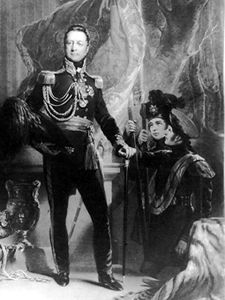Get Today in Masonic History into your Inbox. Sign up today for one of our email lists!
Need an article for your Trestleboard/Newsletter see our Use Policy
George Ramsay, 9th Earl of Dalhousie Passes Away

Today in Masonic History George Ramsay, 9th Earl of Dalhousie passes away in 1838.
George Ramsay, 9th Earl of Dalhousie was a Scottish soldier and colonial administrator.
Ramsay was born on October 23rd, 1770 at Dalhousie Castle, Midlothian, Scotland. He was educated at the Royal High School in Edinburgh. He also attended the University of Edinburgh. At the age of 17 his father passed away. The following year he joined the British Army.
After joining the British Army he served in a variety of units. His first was the 3rd Dragoons. He was later appointed captain of an independent unit which he raised. He then went on to the second battalion of the 1st Foot. In 1792 he purchased the rank of major in the 2nd Foot. With his unit he traveled to Martinique as it's commander. He was severely wounded in 1795, by then a lieutenant-colonel, and returned to England to convelesce. In 1798 he served during the Irish Rebellion. He was promoted to the rank of brevet colonel during the Egyptian campaign. He captured Rosetta without a fight and took over nearby Fort Julien in 1801.
During the later stages of the Peninsular War, Ramsay, now a brigadier-general, served under the Duke of Wellington. Wellington was often critical of Ramsay's performance. One occasion in particular was during the retreat from Burgos. Ramsay as well as two other commanders were ordered to retreat down a specific road. Ramsay and the others decided the road was too long and wet, choosing another. When they came to a blocked bridge, they stopped, which is where Wellington found them, waiting.
Of the incident Wellington said in reference to Ramsay, as well as others, "it is impossible to prevent incapable men from being sent to the army." Despite Wellington's opinion of his service, Ramsay was voted the thanks of Parliament for his service.
In 1815, Ramsay was created Baron Dalhousie. This gave him a peerage and allowed him to sit in the House of Lords by right, previously he sat as a Scottish representative peer.
From 1816 to 1820, Ramsay was Governor of Nova Scotia. From 1820 to 1828 he was Governor General of British North America. Later he was commander-in-chief of India.
Ramsay passed away on March 21st, 1838.
Ramsay was the Grand Master of the Grand Lodge of Scotland from 1804 to 1806.
This article provided by Brother Eric C. Steele.
| S | M | T | W | T | F | S |
| 1 | 2 | 3 | 4 | 5 | ||
| 6 | 7 | 8 | 9 | 10 | 11 | 12 |
| 13 | 14 | 15 | 16 | 17 | 18 | 19 |
| 20 | 21 | 22 | 23 | 24 | 25 | 26 |
| 27 | 28 | 29 | 30 | 31 | ||
Other Events Today
Harry H. Corbett Passes Away
Theodorick Bland, Jr. is Born
Frederick Bennett "Fred" Balzar Passes Away
George Ramsay, 9th Earl of Dalhousie Passes Away

